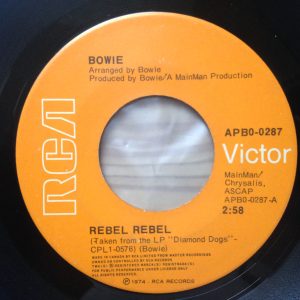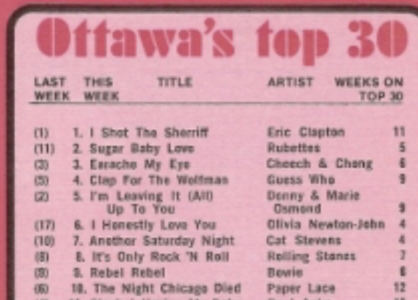#147: Rebel Rebel by David Bowie
City: Ottawa, ON
Radio Station: CFGO
Peak Month: September 1974
Peak Position in Ottawa ~ #8
Peak position in Vancouver ~ did not chart
Peak Position on Billboard Hot 100 ~ #64
Peak Position on Irish Singles chart ~ #2
Peak Position on UK Singles chart ~ #5
Peak Position on Belgian Singles chart ~ #6
Peak Position on Australian Singles chart ~#6
Peak Position on French Singles chart ~ #7
Peak Position on Finnish Singles chart ~ #7
Peak Position on Dutch Singles chart ~ #8
YouTube: “Rebel Rebel”
Lyrics: “Rebel Rebel”
David Robert Jones was born in 1947 in Brixton, a suburb in the southern part of London, UK. From an early age he demonstrated talent as a singer and especially through dance and movement. When he was nine years old his father brought home some 45’s by Elvis Presley, Frankie Lymon & The Teenagers, Fats Domino and others. When David Jones heard Little Richard sing “Tutti Frutti” he later said in an interview that he “heard God.” Growing up, David learned to play the recorder, ukulele, piano and baritone saxophone. In 1962, at the age of 15 he formed a band named the Konrads. In 1964 he formed a band named David Jones and the King Bees. They appeared on the variety show Ready Steady Go! to sing their debut single, “Liza Jane”. Jones briefly moved on to join the Mannish Boys before being the front man for Davy Jones and The Lower Third. They released a single in 1965 titled “You’ve Got A Habit Of Leaving”. Due to the growing popularity of another English recording artist named Davy Jones (who went on to become lead singer for The Monkees), David Robert Jones decided to change his professional name to David Bowie. He chose his surname after a 19th Century American pioneer named James Bowie who invented the Bowie knife.
In 1966 the first single released credited to David Bowie was with his backing band, The Buzz. However, Bowie continued to be met with a string of commercial failures with each single release and his debut album in 1967. He enrolled in the London Dance Center in the fall of 1967. Bowie added mime to his repertoire and was an opening mime act for a tour with Tyrannosaurus Rex in 1968. David Bowie also appeared in a TV commercial for Lyons Maid ice cream. But it was in 1969 with the release of “Space Oddity”, that David Bowie had his first commercial success as a recording star. The single climbed to #5 on the UK singles chart. It was a commercial failure in North America until it was re-issued in 1973 and became a Top 20 hit nationally in the USA and Canada, reaching #4 in Vancouver.
In 1972 Bowie launched a ground-breaking tour billed as the Ziggy Stardust Tour with the Spiders from Mars. The tour promoted his album The Rise and Fall of Ziggy Stardust and the Spiders from Mars and Aladdin Sane. Between January 1972 and June 1973, David Bowie and his band performed at 191 concerts across the UK, North America and Japan. During this time Bowie had a number of Top Ten hits in the UK including “Starman”, “Suffragette City”, “The Jean Genie”, “Drive-in Saturday Night”, “Life On Mars”, “Laughing Gnome”, and “Sorrow”.
In 1974, Bowie released “Rebel Rebel”.

This song is about a boy who rebels against his parents by wearing makeup and tacky women’s clothes. It was a defining song of the “Glam Rock” era. Characterized by feminine clothes and outrageous stage shows, Glam was big in England in the early ’70s. Bowie had the most mainstream success of the glam rockers.
According to biographer Marc Spitz, the lyrics of “Rebel Rebel” revisit familiar Bowie territory, featuring “a ‘hot’ young ‘tramp’ worrying his or her parents with his or her sexy nihilism.” The nihilism is reflected by the line “You got a few lines and a handful of ‘ludes’.” “Ludes” was slang for quaaludes. Methaqualone is a hypnotic sedative. It was sold under the brand names Quaalude and Sopor among others. These contained 300 mg of methaqualone. For the “Rebel” in this song, taking ludes is a way to cope with the world. At the time the Cold War, Yom Kippur War, 1973 Arab Oil Embargo, military coup in Chile, and a world recession filled news headlines. The “Rebel” doesn’t care, suggesting “we like dancing and we look divine.”
The song also features gender-bending lyrics: “You got your mother in a whirl. She’s not sure if you’re a boy or a girl”. To what extent the “juvenile success” in the song is just trying to shock their parents, or has a permanent attachment to gender-bending is inconclusive. However, David Bowie was in synch with an emerging aspect of society. On March 15, 1974, the Guildford Hotel hosted a reception and coffee evening as part of ‘Transvestism and Transsexualism in Modern Society.’ The reception provided an opportunity for conference attendees who had travelled from further afield to socialize prior to a conference at the University of Leeds the next day, and to present as female in a safe environment. The conference was held over the weekend of March 16-17, 1974. It was organized by the Beaumont Society, a support group founded in 1966 for people assigned male at birth who lived and identified as female (then referred to as transsexuals) or who were transvestites who preferred to present as female some or all of the time.
As well, the “rebel” in the song likes “bands when they’re playing hard.” And while on the make, “you want more and you want it fast.”
David Bowie told a reporter about dustbin shopping in the late 60s and early 70s. “At that time Carnaby Street, the fashion district, was going through a period of incredible wealth and rather than replace buttons on their shirts or zippers on their trousers, at the end of the day they’d just throw it all away in the dustbin. So, we used to go up and down Carnaby Street, this is prior to Kings Road, and go through all the dustbins around nine/ten o’clock at night and get our wardrobes together. That’s how life was, you see.”
In the lyrics, the ‘rebel’ is referred to as “calamity’s child.” At the club, “you’ve torn your dress, and your face is a mess.” Moreover, they’re a “tacky thing.” That is to say, cheesy, tasteless, unfashionable, unstylish, and cheap. Nonetheless, Bowie exclaims “you’re a juvenile success.”
The distinctive guitar riff in “Rebel Rebel” is described by rock journalist Kris Needs as “a classic stick-in-the-head like the Stones’ ‘Satisfaction'”. The riff’s chords are D, E, and A and were created by Bowie and enhanced by Alan Parker (musician on Donovan’s “Hurdy Gurdy Man”), who, according to music reviewer Peter Doggett, added the “downward trail” at the end of each line. Paul Trynka writes that Parker added “a particular chord shape rather than the original single note just before the chord change and a distinctive ‘beeeoonng’ in the last line of the chorus just as [Bowie] sings ‘I love you so’.” The guitar riff in this song gave David Bowie serious credibility from music critics, who determined he wasn’t to be dismissed as ‘a dandy.’
“Rebel Rebel” peaked at #1 in Nashville, and Cleveland, #3 in Grand Forks (ND), #7 in Boston, and #8 in Ottawa.
Internationally, the single climbed to #2 in Ireland, #5 in the UK, #6 in Belgium and Australia, #7 in France and Finland, and #8 in the Netherlands. However, it stalled at #64 on the Billboard Hot 100.
In 1975 David Bowie’s Young Americans album produced a minor hit with the title track and a number one hit in the USA with “Fame”. He made the Top Ten again that year with “Golden Years” as his debut single release from Station to Station.
After his chart successes in the USA in 1975, Bowie again struggled to attain chart success across the Atlantic. In the UK he had several Top Ten singles in the late ’70’s: “Sound And Vision” in 1977 and “Boys Keep Swinging” in 1979. But these best chart runs in the UK did no better than #69 on the Billboard Hot 100. And Low, Heroes and Lodger each failed to crack the Top Ten on the Billboard album chart.
In 1980 “Ashes To Ashes” became his second #1 single in the UK. In 1981 Bowie had a #1 single in the UK, featuring Queen. The following year Bowie had a #1 hit in Sweden and Norway with “Cat People (Putting Out Fire)”. But it was his 1983 album release of Let’s Dance which sent him to the top of the album and singles charts. His singles from the album were the title track “Let’s Dance”, “China Girl” and “Modern Love”. To support Let’s Dance, Bowie performed in 96 concerts across 15 countries for his Serious Moonlight Tour.
During the rest of the ’80’s, David Bowie had three notable international hits: “Blue Jean”, “Dancing In The Street” with Mick Jagger, and “Absolute Beginners”. In 1990 his Sound + Vision Tour exceeded his personal best with 108 concerts across 27 countries.
In 1997 Bowie was a featured artist in the #1 hit “Perfect Day”, for the fundraising single for Children In Need.
Bowie made the Top Ten internationally for the last time in 2013 with “Where Are We Now?”, breaking into the Top Ten in 13 countries.
In 2016 David Bowie died on January 8. He was 69 years old. His twenty-fifth and final studio album, Blackstar, was released to critical acclaim. The album climbed to #1 in 23 countries.
August 27, 2025
Ray McGinnis
References:
“About David Bowie,” David Bowie.com.
Nicholas Pegg, The Complete David Bowie, (Titan, 2011) 30.
Sophie Heawood, “David Bowie has Gone from New to Old – and What a Beautiful thing it Is,” Independent, January 8, 2013.
Peter Doggett, The Man Who Sold the World: David Bowie and the 1970s, (HarperCollins, 2012).
Mick Brown, “David Bowie interview from 1996: ‘I Have Done Just about Everything that it’s Possible to Do’,” Telegraph, January 10, 2017.
“Rolling Back: David Bowie’s infamous 1976 interview with Cameron Crowe,” Rolling Stone, Steve Pafford.com, January 2018.
Marc Spitz, Bowie: A Biography, (Crown Publishing Group, 2009).
“Transvestism and transsexualism in Modern Society,” University of Leeds, March 16-17, 1974.

CFGO 1440-AM Ottawa Top Ten |September 23, 1974
* The week of September 30, “Rebel Rebel” climbed to #8

Leave a Reply